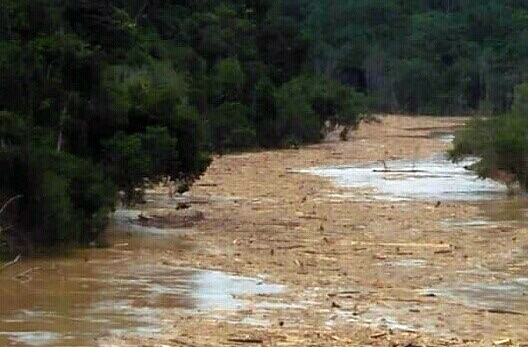Photo shows the mini logjam that occurred in the Kapit area. – Photo from WhatsApp/Koh Kumbong.
KUCHING (Aug 24): WWF-Malaysia has called on the Sarawak government to conduct a thorough and swift investigation on the logjam in the Upper Baleh region and haul the errant parties to court.
In a statement, the organisation pointed out Upper Baleh is an important water catchment area for Kapit, Sibu, Sarikei, and Mukah divisions.
WWF-Malaysia Sarawak Conservation Programme head of conservation Dr Jason Hon said the logjam had affected both the environment and people’s livelihoods in rural and urban areas.
“We cannot allow irresponsible companies to taint the state’s image and jeopardise our efforts towards sustainable forest management and certification,” he said.
He welcomed Deputy Chief Minister Tan Sri Datuk Amar Dr James Jemut Masing’s suggestion that licences should not be renewed for irresponsible timber concessionaires operating in the upper reaches of Batang Baleh.
“This can be traced by the forest authority through the intel unit and remote monitoring system to determine who is the culprit, whether its timber concessionaires, dam developers/contractors, or communities as mentioned in several media reports,” said Hon.
Hon stressed the cost of cleaning up should be passed on to the culprits, as the polluters should pay the price of causing such an environmental disaster.
He explained actions happening in the interior and upstream can aggregate and impact those living downstream as well.
“The impacts have now been felt along the entire Baleh and Rajang. What occurs upstream will affect the communities downstream. Hence, we need an integrated watershed approach.
“This also means users downstream, such as those in Sibu or Sarikei, will have a stake in how the upstream is managed collectively and holistically,” he said.
Hon added it was reported that the logjam not only caused water disruption in the nearest town, Kapit, but further downstream in Sibu as well.
He said a WWF-Malaysia study in 2018 had shown that ecosystem services in Baleh watershed were worth US$93.72 million per year, not including carbon sequestration.
“Sediment and flood regulation services are among the ecosystem services with the highest values to the communities here,” he said.
Hon also pointed out the Upper Baleh region is part of the ‘Heart of Borneo’ landscape, which promotes sustainable use and management of natural resources, both on land and rivers, among different stakeholders.
“But what just happened a few days ago, clearly demonstrates that those concerned failed to use and manage the natural resources sustainably,” he said.
He said the last logjam that made headlines happened about 10 years ago.
However, since the logjam had reoccurred on a different scale, Hon claimed it indicated a lackadaisical attitude towards the environment and promises made to Baleh communities over the years.
“The public have the right to state their frustration and we look forward to the immediate responses from the authorities on how this issue will be mitigated.”


